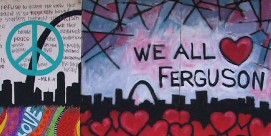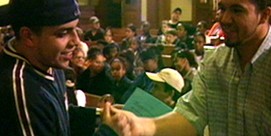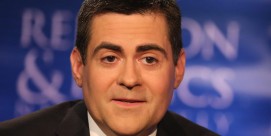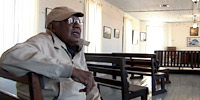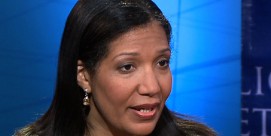TA-NEHISI COATES: (Speaking at Union Baptist Church) One of the dominant ideas in the book "Between the World and Me," which is you know effectively an extended essay told in a letter form to my son, is the notion of fear. Because I think when people think about African American communities there are a lot of things that come to mind, but one of the things that does not come to mind I think enough in the mainstream conversation is simply how afraid we are for our bodies. How afraid we are for our children. How afraid we are for our loved ones on a daily basis.
The threat of violence is always there. I think about how much of my mental space was possessed with keeping my body safe, how much of it dealt with how I was dressed, who I was walking with, what neighborhood I was walking through once I got to school, how I conducted myself, you know, in the school and not so much you know in such a way that would be obedient to my teachers but in a way that would keep me safe from the amount of violence.
The threat never quite leaves us. Because once we're no longer afraid of the neighborhood it turns out we actually have to have some fear for the very people we pay taxes to protect us. And that's what we've been hearing about for the past year over this country, we've been seeing a lot of that and it seems like there's a kind of national conversation going on right now about those who are paid to protect us, who sometimes end up inflicting lethal harm upon us. But for me this conversation is old and I'm sure for many of you the conversation is quite old. It's the cameras that are new. It's not the violence that's new. We are not in the midst of a new wave of anything.
The sort of violence that folks saw in the 1960s in Selma, for instance, on Bloody Sunday, that sort of violence was not in fact actually new, that's what white supremacy, what racism is, it is an act of violence. What was new was the cameras, there was certain technology that was able to take that into the living rooms of America, and we're going through a similar thing right now. But the violence is not new.
And so for normal Americans, once they you know rise up and get out of, you know, certain neighborhoods or go certain places, they feel a kind of safety that black people never feel. Fear is one of the dominant emotions of the black experience. Fear, and there's no amount of money you can earn can ever take you away from that. You can be president of the United States.
You can literally see it evolving across American history, you can see the notion of race evolving from the time the first group of Africans get here in 1619, changing how people talk about things. You know, we know it very well. It's very, very disturbing when you think about it too because one of the things that people say in order to comfort themselves is, well, in 2050 we're gonna be a majority, you know, the dominant majority in this country is going to be people of color. But white people have moved the boundary before. Right? You act like it's been consistent. You know, and people don't realize that. You know there was a time when Irish people were not considered white, Italians were people here were not considered white, you know, Jewish people were not considered—the line's moved, as the power needs the line—there's nothing natural about this. There's no natural line that says Hispanic or Latino. It's—you know what I mean? There's no natural line that says "black."
TA-NEHISI COATES: My earliest memories are of black men in jail. Of being physically restrained. So I was aware—I'm talking like four years old, I guess, is the point when you become like maybe somewhat conscious of what's happening in the world around you. Three, four years old. These are my earliest memories.
So this fear, there's deep-seated fear of bodily harm that never leaves. In fact, it marks African-American life. It may be the premier marker of the black experience under white supremacy in this country, perhaps everywhere.
I'm seeing people that want to live free. I'm seeing people that want to live independent of that fear. I'm seeing people who have been boxed in by American policy to live within that fear. And I see people who want to be free.
One of the arguments of the book is that you are your body. The people who do damage to our bodies do in fact do damage to our minds and our souls. And the act of liberation is ultimately always physical. Even reading is a physical act. It's a physical act.
There were incredible black folks here at Howard. I had never imagined the black world to be that large. There was really just a sense of ancestry. You know, I'm not a particularly spiritual person but one would walk across the yard, you could feel like ghosts walking behind you, right? There was just a great diversity of people, of opinion, and all of them united under this one thing, under this idea of being black.
I sat for a good afternoon and read James Baldwin's "The Fire Next Time." This is like the origin. This is like the beginning, very much, for me right here, so this place we're sitting in is very, very powerful, very, very important to me.
I didn't come out of the church. I don't have an intuitive understanding of what religion gives to people. I just don't, you know what I mean? I didn't really grow up in a Christian household. I grew up in a household with folks that have respect for religion, but it was not a huge, huge force in my life, and so I'm very distanced from that. I think for both good and ill, it probably marks my writing. I don't know where the moral arc of the universe bends, I don't see it necessarily bending towards a more just world. Sometimes the world is more just, sometimes it's not.
"Between the World and Me" is, I hope, a work of art. You know, it's a riff on how we have to talk to our children. And I hope it serves to confirm and validate the experiences of black folks, you know, who are out there and who are going through this every day.

